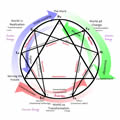Reasoning Toward a Personal Reality
2015-01-10
One of the aspects of reasoning that we’ve mentioned, but which should be highlighted is that the reasoning process is personal. Two people with virtually identical external circumstances could come to two entirely different ‘destinations’ through the process of reasoning. There are several reasons for this.
First, many reasoning processes involve a creative component. Reasoning about what career to take up could go in many directions.
Second, reasoning isn’t about a common morality or conforming to social norms. So there isn’t a one size fits all approach or outcome.
Third, we begin the reasoning process with an honest, hard-nosed appraisal of who we are, what we are capable of doing/being/understanding/accepting. This will be different for each and every person.
Fourth, our experience and capacity to use the reasoning process will influence outcomes. As we gain more experience with this method the reasoning process will deepen, producing quite different results from our ‘beginners’ efforts.
Fifth, every reasoning process takes place in a unique environment. The influence of time, place and circumstance will tend to produce unique results.
We could extend this list, and it would be a good exercise for you to do so if you’re interested in developing your own reasoning process. Nevertheless, we can clearly see that every process of reasoning will have a unique flavor that is personal to us, both in terms of the outcome and in the process by which we arrive at an outcome.
- John Hutcherson's blog
- Log in to post comments

Comments
Reasoning and reasons
JohnG raised a challenging point in today's (13 Jan) session regarding partial or faulty reasoning, that reasoning can be applied for our benefit or detriment and there are several factors that can influence these opposite outcomes. I hope JohnG will write a post about his thoughts since some of the distinctions he made seem quite important for bringing 'discriminating wisdom' to the process of understanding our reasoning.
One distinction that came to my mind was that between reasoning and using reasons. Anyone and everyone who is trying to make a point, influence a buyer, win an argument, or put down another person uses reasons in their process. On the other hand I wonder if the kind of reasoning we are clarifying in group leans toward Reason (more abstract) rather than toward reasons (more concrete). The first seems to evolve toward something more encompassing, while the latter involves into something more material and limited. It may be harder for me to use Reason for my personal ordinary benefit or aggrandizement, but easier to use reasons (whichever specific ones I choose to notice) to serve my individual purpose or agenda versus the benefit of others. So, the question I'm left with is: Could it be that reasoning with Reason helps evolve toward freedom, while reasoning with reasons has the drawback of spiraling us deeper into ego.
I hope that's not too confused. There's no doubt everybody uses reasons, typically to shore up their bias toward themselves when influencing or persuading others. It will take a while, no doubt, to clarify the way in which the kind of reasoning that leads toward greater freedom is different from the kind of reasoning that strengthens our justifications through reasons. I'm wondering if the difference between abstract Reason and concrete reasons might lie in the difference between wisdom and knowledge.